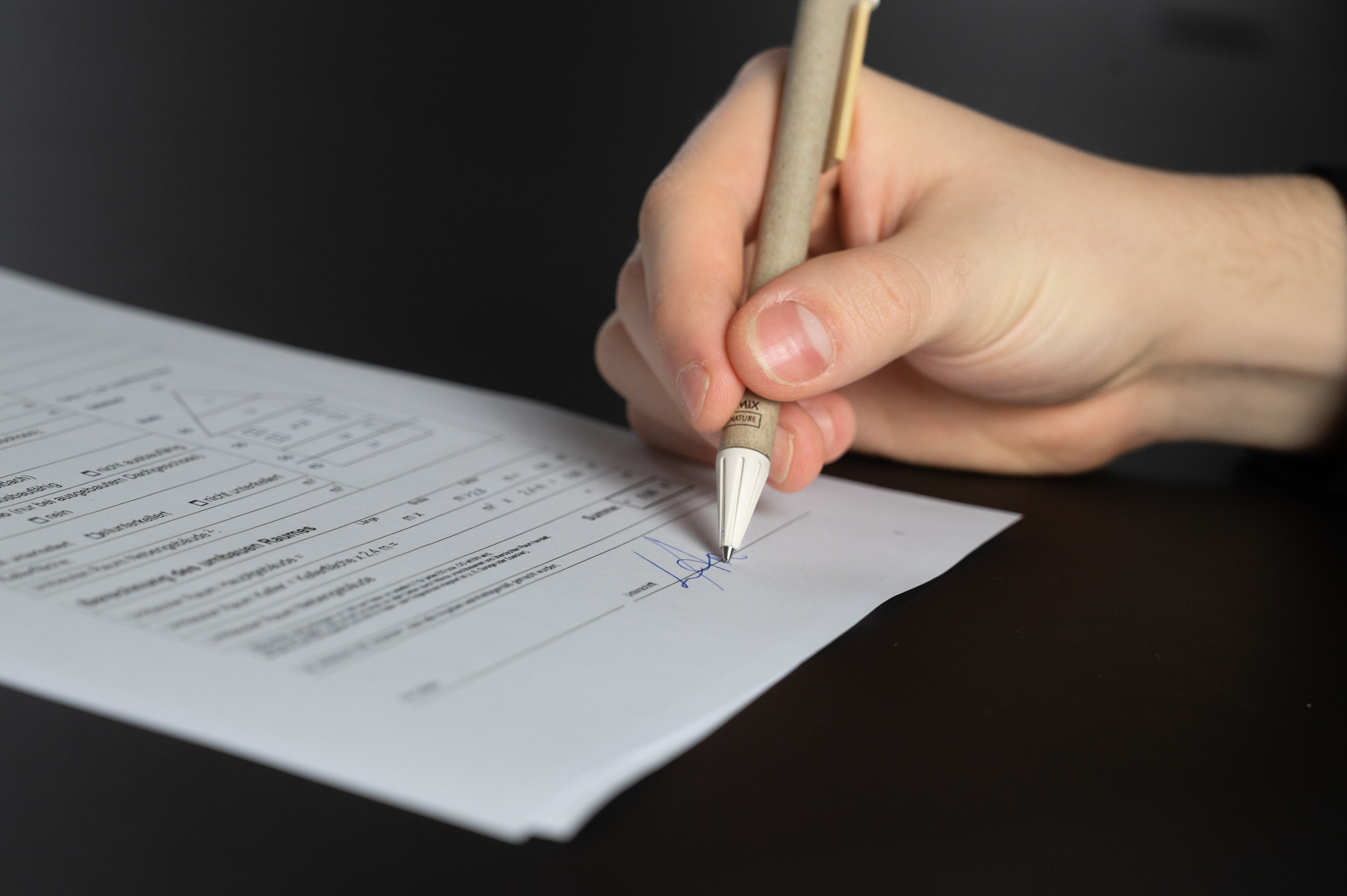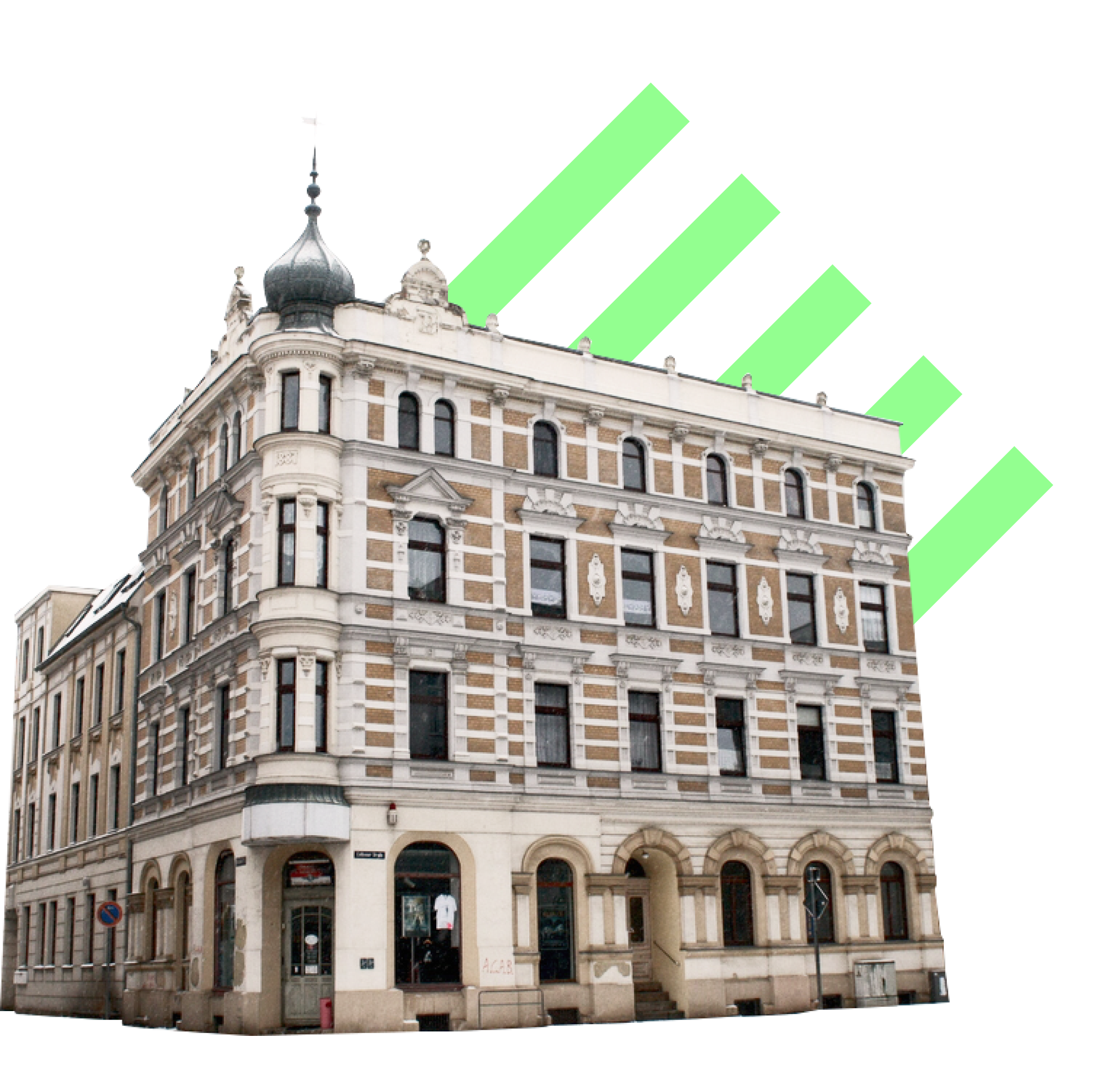Notary Public
Purchasing a Property? Only With a Notary

Hiring a notary is a must if you want to buy a property. As is required by law, purchase agreements must be notarized. And that means paying the notarial fees included in the ancillary purchase costs. Notaries don't come with a fixed price. The fees depend on how much you pay for your property and the required tasks.
But you shouldn't think of hiring a notary simply as another item on your already long expense list: They're a great help and support you in all legal issues concerning the purchase of a property. Unlike lawyers, their role is not to defend or represent a party. Notaries are impartial and advise both you and the seller. They ensure that your interests are protected and that you don't suffer any disadvantages by signing the purchase agreement. They also take care of everything revolving around the land registry: the prior notice of conveyance, land charge, assignment, etc. Basically, all the things that aren't easy to understand yet crucial to transfer the ownership to you.
- Tasks
- Notary Fees
- Notary Nearby
- Procedure
- FAQ
Notary For the Purchase of Property: The Tasks
The notary is your point of contact regarding airtight, legally secure documents for your property purchase. If the draft purchase agreement contains risks for you, your notary will point them out and advise you. This part is valuable because purchase contracts can be written in various ways: Some passages can be worded to skew more buyer- or seller-friendly. Sometimes you'll also come across unusual conditions or clauses.
The goal of the notary is to help you assess and weigh the risks and make an informed decision. Of course, this doesn't apply solely to the acquisition of property.
Caution
If the vendor insists on a particular notary's draft purchase agreement, it's a red flag and a reason to be cautious. It may be that some sentences are worded more vendor-friendly and can turn out as a disadvantage for you.
Our tip: Have the draft contract checked again at a notarial office of your choice.
Beyond giving advice, notaries also have a bunch of other responsibilities. Throughout the notarization process of the purchase contract, the notary does a lot to ensure that your property purchase goes smoothly.
| Before notarization | During notarization | After notarization |
|---|---|---|
| Information on various options for drafting the purchase agreement | Verbatim reading of the purchase agreement | Possible subsequent approval of the purchase agreement |
| Inspection and examination of the land register | Legal review and explanation of critical passages | Request for possible declarations after approval |
| Preparation of a draft purchase agreement | Explanation of the following steps until the handover of the keys | Application for priority notice of conveyance |
| Compilation of the financing documents so that the land charge can be notarized simultaneously with the purchase agreement | Entry of the land charge in the land register | |
| Obtaining official approvals and declarations | ||
| Cancellation of possible liens on property registered by the vendor(s) | ||
| Notification of the competent tax office for the collection of the property transfer tax | ||
| Notification of the due date of the purchase price | ||
| Transfer of ownership in the land register | ||
| Review all changes and inform all stakeholders |
A pretty impressive package, isn't it? As you can see, the real work for the notary begins after you sign the contract.
So how can they do all of these things? Only those who have completed their law studies and passed the first and second state examinations can become a notary. The state judicial administration appoints them. Sounds pretty exclusive, right? It is. Special attention is paid to professional and social competence. A notary must remain objective even in difficult contractual situations. Becoming a notary takes dedication and hard work. You can rest assured that you'll always deal with true professionals.
Notarial Fees When Buying Property: Here's What to Expect
Of course, notaries are paid for their hard work. As the buyer, you bear the notary costs for the property purchase. Costs vary from property to property. The basis for the calculation is always the purchase price. Depending on the value, they may charge different rates.
The respective amount is specified in the notary fee schedule and is thus the same throughout Germany. Depending on the task, the rate may be standard, double, or a fraction of the fee.
And this is what the fee table looks like: Table of notarial fees
If you have any questions about this chart, email us at service@urbyo.com.
Since notaries do many things related to both financing and the land registry when a property is purchased, the notary and land registry fees are always grouped together. The notary costs aren't listed separately — at least we haven't seen that happen yet.
The notary sends you the payment due notices and can inform the relevant offices that all the requirements have been met, and they can send you the invoice.
Overall, you can expect the notary and land registry costs to be about 1.5 to 2% of the purchase price. If you buy a freehold apartment for €200,000, the land registry and notarial fees are about €3,000 - €4,000.
Note
Notarial fees are part of the ancillary acquisition costs. They are not always co-financed by the bank. Ideally, you can pay for utilities with your own money. Low on funds? No worries! Read our information and tips on financing without equity.
Notary Nearby: Not a Necessity
What? No showdown in the notarial office? No. At least it's not mandatory. In Germany, you and the seller(s) can freely choose a notary. You can both go to a notary in your respective areas.
There are notary offices in most cities. You can either search online or drop our colleagues a quick message. They always have a quick tip ready.
Once you've found a notary in the neighborhood, a short email with your request is usually sufficient. The first thing you should do is get a draft purchase agreement from them. Almost all banks require this document to make you a binding mortgage offer. Sending along the most important information will help you receive the draft contract sooner — for example, your contact details and the property's address. So, something like contact details and the address of the property. Find out how it works if the notary appointment is in another city and you do not want to come in person here. 🙌

Template for the certification order
You have no idea how to create a notarization order? No problem. Here's our template 👇
We also have a short mail template for you. You can copy it and adapt it accordingly.
-----
Notarization order
Dear Sir or Madam,
I want to buy a property in XXXXXX and would like to have this notarized with you. The seller will post-approve it accordingly.
Can you prepare a draft purchase agreement and send it by e-mail to me and the seller XXXXXXX (e-mail address XXXXXXX@XXXX.XXX)? You will find the questionnaire with the details of the purchase contract attached.
If you have any questions, please do not hesitate to contact me. You can reach me by phone at XXXXXXXXXX.
Kind regards,
XXXXXXXX
-----
Especially with apartments as a capital investment, the buyer and seller often do not live in the same city. This means that if you buy a property from someone in Dortmund, for example, but live in Hamburg, you don't have to travel to Dortmund for the notary appointment — or vice versa.
The Meeting With the Notary: This Is How It Works
Aside from the notary, attendance isn't mandatory for either party. All of these configurations are conceivable:
Buyer and seller appear at the meeting with the notary and sign the purchase contract together
Only one party is present at the meeting with the notary and signs the purchase agreement
Neither buyer nor seller attends the meeting with the notary but sends a representative without the power of attorney
The first case probably is what most people expect and quickly explained: the notary reads out the purchase contract word for word, and if there are no more outstanding issues, everyone signs it.
In the second case, the procedure is slightly different. If you're the buyer and are in the notarial office, you can have the contract read to you and sign it if everything is in order. Then the notary sends the signed contract to the seller, who then schedules an appointment with a notary of their choice to reconfirm the agreement.
In the third option, the notary won't be alone and read the contract out loud to themselves. Instead, you send another person without the power of attorney to represent you. This person will then sign the contract on your behalf, confirming that you agree to the purchase contract. The notary will then send you the contract by email. You and the other party approve the contract again at a notary of your choice.
Good to know
For subsequent approval, notaries charge a 0.2-time fee. With a purchase price of €100,000, this means about €55.
To summarize: a meeting with the notary is obligatory; you'll have to appear there in person sooner or later. Regarding the timing, this tip may be helpful: Try to schedule the appointment before the 14-day cancellation period of your loan agreement expires. Otherwise, you're stuck with a mortgage agreement you can no longer easily cancel if the purchase falls through for whatever reason.
If you want to know more about it, send us an email.





